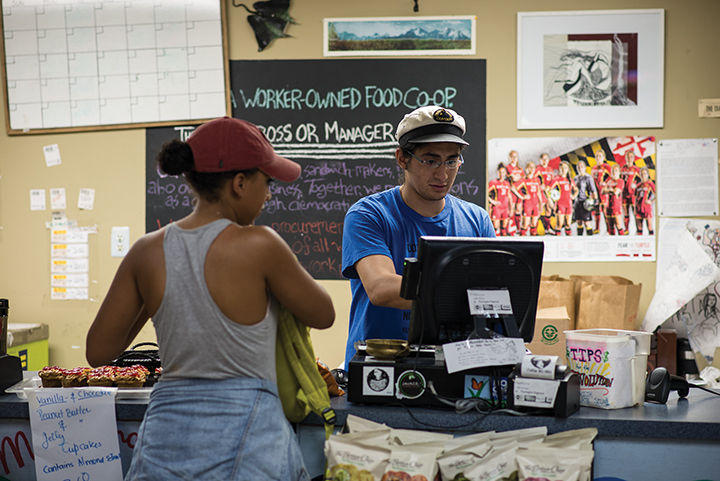
Xavier Moncayo-Escala, a fifth year economics major, rings up a customer at the cash register of the Maryland Food Collective in The Stamp Student Union. The Co-op is celebrating its 40th anniversary.
Starting out as a guerrilla sandwich line in 1975, the Maryland Food Collective, known as “the Co-op,” is now celebrating 40 years of business.
“[The sandwich line] would appear somewhere on campus with a picnic table and a basket full of sandwiches and ingredients to make sandwiches, and people would just begin to make them,” Co-op worker Chris Litchfield said. “A bit illegal, as there were no health code permits or anything, but it became a healthier alternative to the dining hall.”
To celebrate its 40th year, Co-op workers are planning to hold a barbecue Sept. 13 at the main entrance of Stamp Student Union. They are also planning a large gathering in the spring.
“We want to keep doing fun events throughout the entire year to give back to our customers,” Litchfield said.
In 1975, this university promised students funding for a food co-op, a lending library and a housing co-op. Shortly after, however, administrators canceled all of the projects and allocated the money elsewhere, which created a mass student resistance movement, Litchfield said.
“Eventually, the university agreed to give space and reduced rent to students that wanted to start the Maryland Food Collective,” he said.
Since 1975, the Co-op has had a prominent campus presence, but it was not truly opened or dedicated until 1976, Litchfield said.
The Co-op started its mobile sandwich line on Feb. 18, 1975, serving 100 people its first day outside of the Student Union. The Co-op sold sandwiches, yogurt, nuts, cookies and fresh fruits.
However, the university threatened to shut down the Co-op just a few days later after it served food indoors in the Macke Room in Stamp. The Co-op was in violation of university policy by operating inside without permits.
Matt Mayer, the Co-op spokesman at the time, said the Co-op would comply with the university policies and health regulations once they were given a place on-campus to serve food.
Now operating in Stamp’s basement under the motto “Food for people, not for profit,” the Co-op provides low-cost, mostly organic and vegetarian foods to students, staff and visitors.
“It’s very alternative — a very crunchy granola-type place, and I like that about it,” said Liz Scanlon, a senior environmental science and policy major.
Scanlon described the atmosphere of the Co-op as a “low-key, relaxed experience.”
The Co-op does business in alternative fashion as well.
“We are a worker-owned business, a collectively owned business,” Litchfield said. “That means we have no boss or manager and we are all responsible for the operations.”
The Co-op is adopting a few ambitious goals to mark its milestone, including producing food more efficiently and creating different pricing options for their products, Litchfield said.
“We hope to get ourselves back to a financial place where we can pay ourselves a living wage,” Litchfield said. “That is really important to us. … If we are going to be an ethical restaurant and yet be paying property wages to ourselves, we’re not doing justice for what we stand for.”
Everything offered at the Co-op is fresh and cheap, especially if someone is on a budget, said Griffin Moskowitz, a junior English major.
“I don’t go as much because now I live in an apartment off-campus, but when I lived on-campus last year I would always come here because I would get tired of icky diner food,” he said.
Moskowitz said he switches between the Mediterranean and Tofutopia sandwiches when he finds himself at the Co-op.
Scanlon, a vegetarian, said she finds there are more options that fit her diet available at the Co-op than at the restaurants on the second floor of Stamp.
“We try to source locally, have organic food and try to have healthy options,” Litchfield said. “We have always been vegan and vegetarian-focused. While we do want to serve food that is successful with everybody, we do want to recognize that all life is important — animal and human life.”
Not many employee-run businesses have survived as long as the Co-op has, and there is a lot of responsibility to uphold that legacy, Litchfield said.
“Working here is the hardest job I have ever had, but that being said, it’s the most rewarding, because I know that at the end of the day, the work I do directly supports my co-workers,” Litchfield said.



